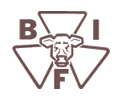NAAB Symposium Abstract
The Best-kept Secret in the Commercial Cow Business
Abstract:
As an industry, we have made people think artificial insemination (AI) is very difficult. I happen to be living proof that it is NOT! Facilities are always talked about and how perfect they have to be, and the better they are the easier it is. But for a lot of us commercial cowmen, we simply don’t have an elaborate AI facility.
Ranchers may not think they have the time, but really the average amount of time for a synchronization program is 3-5 minutes per cow. That includes three trips down the chute, but not the sorting and gathering. Don’t let time be a deterrent.
AI not only saves us money, it makes us money as well. Herd improvement for the future is one large advantage. There is a sense of pride and a feeling of assurance when calving heifers, who are all half-sisters, are bred to the same bull.
The prize is the value added to our calf crop. Our steers consistently sell above the average market price, and our heifers are sought after. AI has given us the advantage of raising our own bulls and having them be all half-brothers. That gives us the consistency in genetics for the whole herd. Another added benefit is we market a few bulls to friends and neighbors who order their bulls in advance. None of this would be possible without AI.
Using AI in your commercial operation takes a lot of planning, but if you have a 60-day calving season, a good mineral program and a vaccination program, you are ready to go. Let the registered breeders do the legwork of raising the superior bulls, then go breed your whole cow herd to those bulls. High-powered genetics and higher profits are within your grasp. Reach for them.
Click here to view proceedings.
About the speaker:
Herb Holzapfel farms rice and raises beef cattle on ranches in northern California and eastern Oregon. His mother and father started the ranch in 1943. Herb has been in the commercial cow business since graduating from California State University, Chico, in animal science. He became a member of Farmers’ Rice Cooperative in 1985 and presently serves as chairman of the board. He also serves as director of the Colusa-Glenn Production Credit Association. His interests include rice legislation, marketing, water and environmental legislation and regulation.
Editor’s Note: The above material is provided by and posted with permission of the Beef Improvement Federation. Please direct reprint requests to BIF via the “Contact BIF” page at www.beefimprovement.org.



